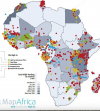In fiscal year 2024, the United States has provided nearly $6.6 billion in humanitarian assistance to sub-Saharan Africa.
During his visit to Angola, US President Joe Biden announced on Tuesday, December 3, more than $1 billion in humanitarian assistance to combat food insecurity and meet urgent needs in 31 African countries.
According to the press release from the United States Agency for International Development (USAID), nearly $823 million will be allocated by the agency, of which more than $202 million comes from the Department of Agriculture, and approximately $186 million through the State Department.
This initiative responds to the commitment made at the 2022 U.S.-Africa Summit by the U.S. official to African partners “to accelerate progress toward food security, including by addressing the immediate and acute crisis of food insecurity through humanitarian assistance,” the statement noted.
The assistance will provide emergency care, water and sanitation services, and protection, mental health, education and shelter programs for refugees and internally displaced people. With support from the Commodity Credit Corporation, agricultural commodities will be delivered to East and Central Africa.
Sub-Saharan Africa is in the midst of a food crisis, driven by a combination of conflict, extreme weather events and economic challenges. As of February 2023, approximately 146 million people were acutely food insecure, according to the Red Cross. The United Nations Office for the Coordination of Humanitarian Affairs (OCHA) estimates that humanitarian needs in 2024 will be $10.9 billion for Eastern and Southern Africa, and $8.3 billion for Western and Central Africa.
In fiscal year 2024, the United States has provided nearly $6.6 billion in humanitarian assistance in sub-Saharan Africa. They call on other donors to increase their support to address this crisis.





























Réagissez à cet article